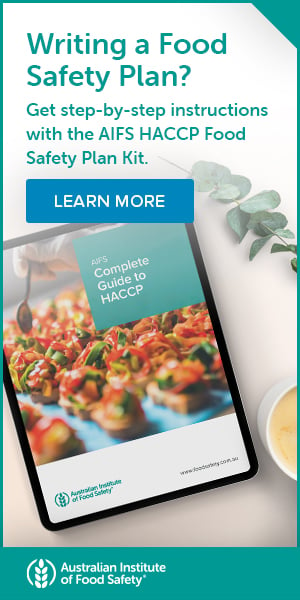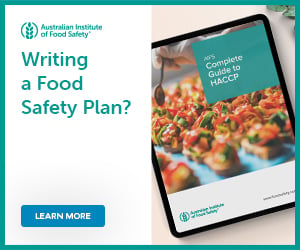
If you own or manage a food business, you are probably aware that a new, stricter food standard will come into effect on December 8, 2023: Standard 3.2.2A - Food Safety Management Tools.
This standard classifies food-handling businesses into several categories with increased food safety requirements. Depending on their activities and category, Australian food-related businesses will have to implement two or three food safety management tools on top of their existing Chapter 3 obligations.
You must have many questions, such as:
- Does Standard 3.2.2A apply to my food business?
- Which is my category according to Standard 3.2.2A?
- What are the new requirements created by Standard 3.2.2A?
- Do I need to re-certify my Food Handlers or Food Safety Supervisors?
- Does my entire team need to take a Food Safety Supervisor Course?
- What must I do to be ready before December 8?
- How will compliance with Standard 3.2.2A be monitored and enforced by authorities?
- What are the specific penalties or consequences for non-compliance with Standard 3.2.2A?
- Are there any training or support programs available to help food businesses meet the new requirements of Standard 3.2.2A?
Let’s tackle those questions one by one.
Does Standard 3.2.2A apply to my food business?
The standard applies to the vast majority of food service and food retail businesses, such as:
- restaurants, cafés, pubs, hotels with table service, takeaway and smorgasbords
- supermarkets and delis
- takeaway shops, mobile food vendors and juice bars
- hospitals, aged care facilities and childcare centres
There are a few exceptions, though. The standard does NOT apply to food handling businesses or situations such as:
- food handling at an event raising funds solely for charity (e.g. a sausage sizzle)
- businesses that only manufacture or wholesale food (e.g. a manufacturer of bulk food that is sold packaged to supermarkets)
- other food businesses that are not serving or retailing unpackaged food that is potentially hazardous and ready to eat (e.g. retailers selling food that remains in its original packaging).
Which is my category according to Standard 3.2.2A?
Does your business handle potentially hazardous or unpackaged food? How much will the new standard affect you? Let’s start by finding out which category you fall into.
Standard 3.2.2A says that a category one business:
- Is a caterer or food service
- Processes unpackaged potentially hazardous food
- Makes food that is both ready-to-eat and potentially hazardous
- Serves food for consumption
The main gist is that category one businesses handle food directly, so it may be exposed to contamination before it is served.
If this doesn’t sound like your business, let’s take a look at category 2. Standard 3.2.2A says that a category 2 business:
- Offers potentially hazardous and ready-to-eat food
- Receives the food unpackaged, or unpackages food after receiving it
- Does not process food in ways besides slicing, repacking or hot-holding
What are the new requirements created by Standard 3.2.2A?
Standard 3.2.2A is called “Food Safety Management Tools” because it is about enforcing three specific tools for all applicable food handling businesses, according to their category.
- Category 1 businesses must implement all three tools
- Category 2 businesses must only implement the first two
Let’s go over the tools now. The Food Safety Management tools that Standard 3.2.2A is now making a requirement for many businesses like yours are:
1. Food Handler Training
The standard’s exact wording is:
All food handlers undertaking prescribed activities must have completed a food safety training course or have appropriate skills and knowledge.
This means that if Standard 3.2.2A applies to your business, then every employee who handles high-risk food needs to either have completed a Food Handler course or have proven their knowledge and experience on this or a previous job.
The standard is very specific about the required skills and knowledge, and not just any course will do.
An approved course should cover, at the very least: safe handling of food, food contamination, cleaning and sanitising of food premises and equipment, and personal hygiene. The best way to make sure these are covered is by taking a nationally recognised Food Handler Certification Course.
One thing to keep in mind about members of staff who have not completed a course: if an authorised officer is not convinced that a food handler has the necessary knowledge and skills, they may request that said food handler go through some training.
FSANZ also recommends that business owners and managers also consider taking Food Handler training even if they don’t handle food, so they can better understand and mitigate risks.
2. Food Safety Supervisor
First, let’s see what the standard says:
The intended outcome is that food handlers in category one and two food businesses are adequately supervised by a trained and competent supervisor.
Note that this applies to both categories in the standard, which means every Australian business in the food service, catering and retail sectors, that handles unpackaged, potentially hazardous food that is ready to eat.
Is your business included in Standard 3.2.2A? Then you will need to appoint a trained Food Safety Supervisor before handling any high-risk foods. You are probably already conducting business every day, and you may wonder what the standard means by ”before”. Remember that the standard will come into effect on December 8, 2023, so you will have to make sure your business is fully compliant before that date.
If you already have a trained Food Safety Supervisor, make sure their certificate is still valid - FSANZ requires food Safety Supervisors to refresh their training every 5 years, so their knowledge and skills are up-to-date and relevant. And just like with Food Handler training, Food Safety Supervisor training must be provided by a registered or accredited training organisation.
3. Record keeping
The final food safety management tool is only required for category one businesses, so if it applies to your business this is what you need to do according to the Standard:
Records or other evidence to substantiate that specific activities are being properly
managed (prescribed provisions of Standard 3.2.2, listed in clause 12).
First, let’s look at what the standard says:
The food business must make a record that substantiates any matter that the prescribed provisions require in relation to that prescribed activity.
This wording may seem confusing, but we will translate it for you. This requirement for Category 1 businesses (those that handle or process high-risk food that will be served or sold for consumption) means they must keep track of several parameters in a reliable format, such as paper or digital documents, photos or video. You must be able to produce this documentation whenever it is requested by the authorities.
Some of the parameters you may need to record include:
- Temperature charts
- Record of process controls
- Cleaning and sanitising schedules
- Delivery logs
What must I do to be ready before December 8?
Every business is different, and as you just saw, Standard 3.2.2A has different requirements for different types of food-related activities. Still, this checklist is a good place to start:
- Determine if the Standard applies to you, and which category your business falls into
- Take stock of your staff’s qualifications. Who needs to train or retrain?
- Make sure you have a Food Safety Supervisor in every venue as required.
- Get your current Food Safety Supervisors certified, or make sure their accreditations are up to date.
How will compliance with Standard 3.2.2A be monitored and enforced by authorities?
Compliance with Food Safety Standard 3.2.2A is typically monitored and enforced by local or national food safety authorities. These authorities conduct regular inspections, review food safety records and ensure that food businesses adhere to the standards set in the regulation.
If a business fails to comply, it may face penalties such as fines, mandatory training or even closure until compliance is achieved. For detailed enforcement mechanisms specific to your locality, you may need to consult local government websites or food safety authorities.
What are the specific penalties or consequences for non-compliance with Standard 3.2.2A?
The specific penalties for non-compliance with Food Safety Standard 3.2.2A can vary based on jurisdiction but generally include fines, orders to rectify the non-compliance, temporary suspension of business operations or even permanent closure for severe violations.
Some regions may also impose legal proceedings against the food business owners or managers. For detailed information on penalties applicable in your area, it's best to consult with the local authorities.
Are there any training or support programs available to help food businesses meet the new requirements of Standard 3.2.2A?
As a Registered Training Organisation (RTO), the Australian Institute of Food Safety is able to offer specific training programs and resources to help food businesses comply with Standard 3.2.2A.
As always, we are here to help you and your business. Contact us if you want to take advantage of our business solutions or if you need any more information!
If you want to learn more about Standard 3.2.2A - visit our dedicated 3.2.2A Information Page here.





